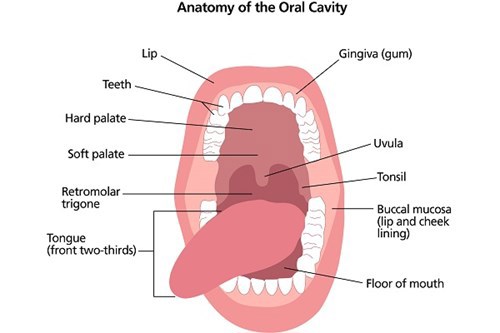Risk factors for mouth cancer
The most important risk factors for mouth cancer are smoking and drinking alcohol. Overexposure to sunlight and UV light can increase the risk of lip cancer. However, some patients may not have any obvious cause for their cancer.

Cancers of the tongue, gums, inside of cheeks or lips, under the tongue and lips are also known as ‘oral cavity cancers’. Patients may experience an ulcer or sore that does not heal. Sometimes patients may have pain, bleeding, weight loss or a lump on the side of the neck. Some patients may have trouble eating or swallowing, or may notice a change to their speech.
Treatments for mouth cancer include surgery, radiotherapy, chemotherapy, targeted therapy and immunotherapy.
